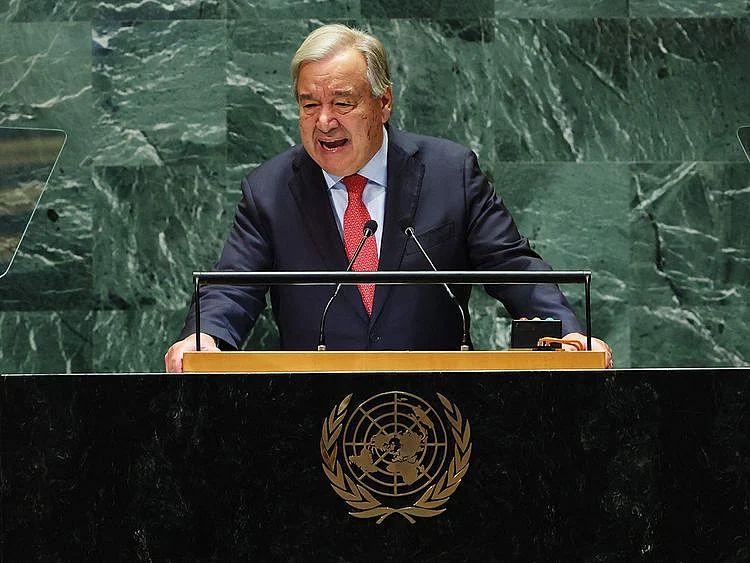World on Edge: Guterres’ urgent call for unity
UN chief warns that division and inaction push the world toward catastrophe

As world leaders gathered in New York for the annual UN General Assembly this week, the gravity of the moment was unmistakable. In his opening remarks, UN Secretary-General Antonio Guterres delivered a sobering address to a room filled with presidents, prime ministers, and diplomats.
With an intensity that couldn’t be ignored, he warned that our world is “on a powder keg,” teetering on the edge of global calamity. His message was not just a formal statement; it was a heartfelt plea for humanity to wake up.
“We can’t go on like this,” Guterres said, capturing the mood of a world drowning in crises — geopolitical conflicts, economic inequality, and the relentless march of climate change. His voice, unshakeable but edged with urgency, resonated as a collective cry, not just from the UN’s marble halls but from the millions suffering on the ground.
Behind the polished rhetoric of international diplomacy lies a simple truth: people are suffering, and they are suffering now. When Guterres spoke of a world on the edge, it wasn’t abstract. In Gaza, families live in constant fear of bombs and destruction.
Across the globe, whether it’s the heatwaves ravaging crops or wildfires swallowing homes, people are enduring hardships that no speech could fully encapsulate. Guterres wasn’t just listing the crises; he was, in a sense, giving voice to the anguish felt by those who often have none.
Also Read
Global Heatwaves: A stark reminder of accelerating climate crisisReflecting on 9/11: A day that changed the worldBoeing’s Starliner: A troubled capsule’s last standKamala Harris’s Bold Pick: Tim Walz as a breath of fresh air for AmericaEvery statistic about war, climate disasters, and inequality is a human being’s story — a mother who can’t feed her children, a father searching for shelter, a child wondering why their home is gone.
When Guterres spoke of climate change, it wasn’t just to remind leaders of rising temperatures or melting ice caps. His words were a reminder of the human toll: the farmers whose fields have dried up, the families displaced by floods, the children growing up in a world where clean air and safe drinking water are no longer a given.
This year alone, we’ve seen deadly wildfires sweep across Canada, floods ravage Libya, and scorching heatwaves turn cities into furnaces. Behind each of these events are people who’ve lost their homes, their livelihoods, their loved ones.
Guterres was asking world leaders not just to think about the planet’s future but to consider the human beings living on it right now — those who cannot wait for another climate summit, another round of negotiations. They need help today.
Return to multilateralism
In an era defined by division, the call for a return to multilateralism — for countries to work together — felt less like a bureaucratic proposal and more like a personal appeal for empathy.
The UN boss reminded leaders that the United Nations was born out of a desire for peace and cooperation after the devastation of two world wars. His question, implicit but powerful, was simple: Have we forgotten that mission?
Guterres urged world leaders to reform the very system they now benefit from, to look beyond their own borders and see the shared human challenges that connect us all. The message was a reminder that while the halls of the United Nations may seem far removed from the front lines of conflict and disaster, the decisions made there ripple outwards, touching the lives of billions.
Despite the bleakness of the world Guterres described, there was a glimmer of hope in NYC this week. Perhaps we are still capable of change, still capable of coming together to confront these immense challenges. The question is: will we?
In a world so accustomed to division and conflict, perhaps the appeal at UN was not for immediate solutions, but for a shift in mindset — for leaders, and indeed all of us, to remember the shared humanity that binds us together. For as much as the world is on edge, it is still within our power to pull it back.
As the General Assembly moves forward, the message lingers. The world cannot go on like this. The choice to turn away from the brink is still in our hands — but only if we act with the urgency and compassion this moment demands.
Rachel Williams is an American researcher and columnist exploring the intersection of politics and innovation
Sign up for the Daily Briefing
Get the latest news and updates straight to your inbox
Network Links
GN StoreDownload our app
© Al Nisr Publishing LLC 2026. All rights reserved.